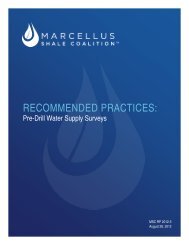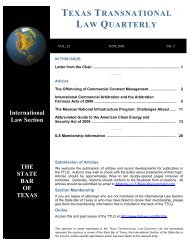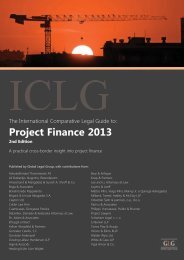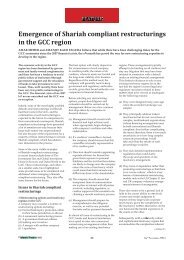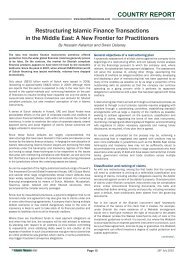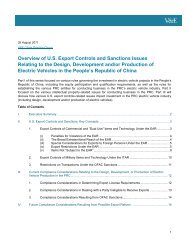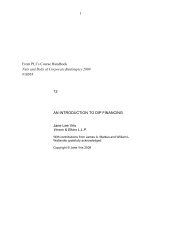You also want an ePaper? Increase the reach of your titles
YUMPU automatically turns print PDFs into web optimized ePapers that Google loves.
V&E LOGO<br />
One of the four FTC commissioners, Commissioner<br />
Rosch, dissented in part with respect to the exclusive<br />
dealing allegations in the DIPF actions which he<br />
believed were not based on unlawful conduct. Moreover,<br />
Commissioner Rosch disagreed with the allegations against<br />
Star, which he stated seemed “much less culpable” than<br />
those of McWane or Sigma.<br />
Swimming Pool Product Distributor<br />
In January, the nation’s largest pool products distributor,<br />
PoolCorp finalized its settlement of Section 5 allegations<br />
with the FTC. In November, the FTC alleged that PoolCorp<br />
had impeded new distributors from entering the distribution<br />
business by signing exclusive agreements with pool product<br />
manufacturers. The FTC had concluded that PoolCorp’s<br />
market share exceeded 80 percent in some areas and<br />
accounted for 30 - 50 percent of most pool supply<br />
manufacturers’ sales, making it by far their largest<br />
customer. The commission concluded that PoolCorp<br />
abused its clout to prevent manufacturers from selling<br />
to distributors trying to enter the market. The settlement<br />
agreement prohibits PoolCorp from (1) conditioning a<br />
manufacturer’s purchase or sale of pool products or<br />
participation in PoolCorp’s preferred vendor program,<br />
on the intended or actual sale to another distributor;<br />
(2) pressuring a manufacturer to limit its sales to another<br />
distributor; or (3) discriminating against a manufacturer for<br />
selling to another distributor. The settlement also requires<br />
PoolCorp to implement an antitrust compliance program.<br />
Commissioner Rosch dissented to the exclusive<br />
dealing allegations against PoolCorp, because the FTC<br />
has “not been able to identify any harm to consumers<br />
or competition as a result of the actions of PoolCorp,”<br />
and recommended that the commission drop its complaint.<br />
Commissioner Rosch emphasized that the FTC had not<br />
alleged any harm to incumbent distributors, only new<br />
ones, but noted that “no entrants were actually excluded.”<br />
He emphasized that entrants and other distributors<br />
maintained access to multiple manufacturers despite<br />
PoolCorp’s exclusive contracts with certain manufacturers<br />
and noted that the barrier to entry for new distributors<br />
was low. ■<br />
DOJ Approves Constellation-Exelon<br />
Merger on Condition That Parties<br />
Divest Three Power Plants<br />
By Sandeep Vaheesan<br />
On December 21, 2011, the Department of Justice<br />
(DOJ) approved the merger between Exelon Corporation<br />
(Exelon) and Constellation Energy Group, Inc.<br />
(Constellation), subject to divestitures of certain assets.<br />
Exelon and Constellation are wholesale electricity<br />
generators that own 25,000 MW and 11,000 MW of<br />
generation capacity, respectively. In 2010, Exelon had<br />
annual revenue of $18.6 billion and Constellation had<br />
annual revenue of $14.3 billion. Both companies own<br />
significant generation capacity in the Pennsylvania,<br />
Jersey, Maryland Power Pool (PJM), which operates the<br />
wholesale power market in the Mid-Atlantic and several<br />
Midwestern states.<br />
Because of inadequate high-voltage transmission<br />
capacity, the PJM market during many hours of the<br />
years, in effect, “breaks up” into smaller markets that<br />
need to rely on local generation to meet demand. Two of<br />
these markets are PJM Mid-Atlantic North and PJM Mid-<br />
Atlantic South, which together cover eastern Pennsylvania,<br />
eastern Maryland, Delaware, Washington, DC, and most of<br />
Virginia. During periods of high demand, there is often not<br />
enough transmission capacity to permit generators outside<br />
these areas to sell power to customers located in them. As<br />
a result, locally situated generators must run to meet<br />
demand. Due to these physical constraints, the DOJ<br />
defined PJM Mid-Atlantic North and PJM Mid-Atlantic South<br />
as the geographic markets of interest in this merger.<br />
Constellation and Exelon both own generation plants<br />
in PJM Mid-Atlantic North and PJM Mid-Atlantic South.<br />
After the merger, they would own 28 percent of the capacity<br />
in PJM Mid-Atlantic North and 22 percent of the capacity<br />
in PJM Mid-Atlantic South. In addition, they would own a<br />
portfolio of low-cost “baseload” plants that run nearly all<br />
the time and high-cost “peaking” plants that operate at<br />
times of higher demand. Due to this combination, the highcost<br />
peaking plants can be used to raise market prices to<br />
increase the profits of the low-cost baseload plants. On this<br />
basis, the DOJ alleged that the merging parties’ mix of<br />
assets would give them the ability and incentive to raise<br />
wholesale electricity prices.<br />
3




